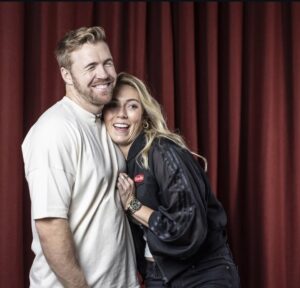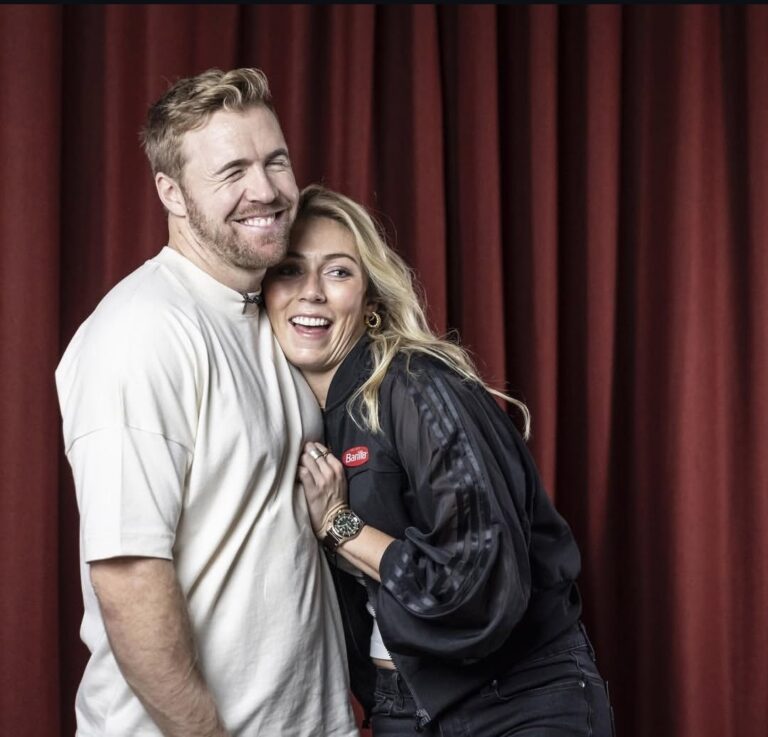While Mikaela Shiffrin celebrated her record-extending 102nd World Cup victory under the Arctic lights of Levi, the story transcending the podium was one of partnership, resilience, and shared dreams. Her fiancé, Norwegian downhill star Aleksander Aamodt Kilde, watching from Colorado amid a meticulous shoulder rehabilitation, offered a window into the authentic bond fueling both their comebacks—and their future beyond the finish line.
Shiffrin’s commanding Levi slalom sweep on Saturday (1:48.92, +1.66s over Albania’s Lara Colturi) not only launched her 2025/26 campaign with authority but also served as a beacon for Kilde, who has spent the past 22 months rebuilding from a catastrophic January 2024 crash at Wengen. The high-speed tumble dislocated his right shoulder, severed two ligaments, and triggered a life-threatening infection that required three surgeries—the latest in February 2025 using a hamstring graft. Now 33, Kilde remains sidelined from speed events but has relocated to Copper Mountain, Colorado, to train alongside the U.S. and Norwegian teams, targeting a December return at Beaver Creek.
“We’re better together—that’s not just a slogan, it’s our reality,” Kilde said in an exclusive November 14 interview from the Centennial State. “Mikaela’s focus, her ability to reset after setbacks… it’s contagious. Every time she drops into a course, I’m reminded why I fight through the pain.” The couple, engaged since April 2024, have turned injury into intimacy—sharing physio sessions, late-night strategy talks, and even synchronized recovery playlists featuring ABBA and Brazilian funk.
Their journey began in 2020 at a World Cup in Åre, Sweden, when Shiffrin—still grieving her father’s sudden death—found unexpected solace in Kilde’s quiet empathy. What started as post-race coffees evolved into a partnership that has weathered Beijing heartbreak, COVID isolation, and dual injury lay-offs. “He taught me it’s okay to be human on the mountain,” Shiffrin reflected after Levi. “And I try to give him the same permission off it.”
The couple’s transparency has resonated globally. In their October 29 podcast launch, What’s the Point with Mikaela Shiffrin, Kilde detailed the “tunnel of darkness” post-crash—nerve damage that left his arm temporarily paralyzed—and how Shiffrin’s daily check-ins became his lifeline. “She’d send voice notes from training: ‘One gate at a time, Aleks.’ Simple, but it kept me grounded,” he shared. Shiffrin, in turn, credits Kilde with helping her reframe Beijing’s three DNFs: “He reminded me medals don’t define legacy—growth does.”
As Milano Cortina 2026 looms—now just 90 days away—the duo is strategically aligned. Shiffrin, 30, chases a third Olympic slalom gold and a potential sixth overall crystal globe. Kilde, cleared for light downhill training, eyes a super-G or downhill podium, his first since the 2023 World Championships. Their schedules sync at key camps: Portillo in August, Soelden in October, and planned joint sessions in Zermatt before Christmas.
Yet the vision extends beyond medals. In a candid moment during Levi’s post-race press conference, Shiffrin addressed family plans: “After Cortina, we want balance—kids, maybe a foundation for young athletes. But right now? It’s about showing up for each other.” Kilde echoed the sentiment from Colorado: “We’ve both sacrificed enough. The next chapter is about building something lasting—together.”
Norwegian sports director Claus Ryste confirmed Kilde’s progress: “His power numbers are elite; the shoulder stability is the final hurdle. We’re optimistic for Beaver Creek, but no risks.” U.S. Ski Team performance director Patrick Riml added, “Having Aleks in our environment lifts everyone—Mikaela included.”
As Shiffrin heads to Killington next weekend for giant slalom, Kilde will be trackside via livestream, rehab dumbbells in hand. Their mantra—“We’re better together”—isn’t just romantic; it’s tactical. In a sport where milliseconds separate glory and regret, the Shiffrin-Kilde partnership proves that the strongest edge isn’t carved alone.
